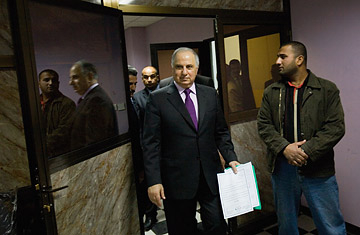
Flanked by one of his numerous bodyguards, Ahmad Chalabi walks into a meeting, February 7, 2007, in Baghdad.
Ahmad Chalabi is nothing if not indefatigable. The dapper Iraqi multimillionaire who was instrumental in pressing the U.S. to invade Iraq — and viewed by many in Washington as the presumptive leader of a future Iraqi government — failed to win a seat in his country's parliament in 2005, and came under suspicion in Washington of passing secrets to Iran (although no charges were ever filed in this respect). Still, he bounced back, and was tapped last November to run a committee tasked with improving the delivery of basic services such as water and electricity in Baghdad. The post required coordinating with U.S. officials including General David Petraeus, and Chalabi hoped to use it to begin building a new power base on the streets of Baghdad, especially among the 2.5 million potential voters of the hardscrabble Sadr City.
But not if Washington has any say in the matter: This week, according to two U.S. officials, America's diplomats and military liaisons were told to cut off ties with Chalabi. One official said the instruction came in anticipation of Chalabi being taken off the Baghdad Services Committee, adding that if the Iraqi government is removing him from his position, then there is no need to contact him or provide support. NBC News first reported the rebuke on its website, citing American concern over Chalabi's contacts with Iran. A spokesman for the U.S. Embassy in Baghdad would not elaborate on the order, saying "we maintain contact with a wide variety of Iraqi interlocutors." Chalabi, through a spokesman, said he had not been informed of any change in his relationship with the U.S. or Iraqi governments. Chalabi also denied that his dealings with Iran were any different from those of Iraq's current President, Jalal Talibani, or Prime Minister Nouri al-Maliki.
Allegations about Chalabi's ties to Iran are not new. His Baghdad compound was raided in 2004 when U.S. officials suspected he had warned Iranian intelligence that the U.S. had broken its communications codes. A subsequent FBI investigation led to no charges, and Chalabi was never questioned in the matter, even when he traveled to the U.S. in 2005 as a deputy prime minister of Iraq. Since then, U.S. contact with Chalabi has been mostly limited to his efforts to bring power generators and water trucks to the most neglected neighborhoods of Baghdad.
His new position had provided Chalabi with some political capital, and a little publicity. His political organization, the Iraqi National Congress, recently launched a weekly newspaper dedicated to citizens' complaints about the lack of services around Baghdad. An op-ed published in the Wall Street Journal on April 12 wrote that "arguably [Chalabi] has, more than anyone in the country, evolved a detailed sense of what ails Baghdad and how to fix things."
Over the past six months, Chalabi has focused a lot of attention on delivering services to Sadr City, the northeast Baghdad Shi'ite slum that is a major stronghold of the firebrand cleric Moqtada al-Sadr. To do this required close coordination with al-Sadr's Mahdi Army militia, which has over the past month been locked in fierce battles with U.S. and Iraqi government forces. The U.S. alleges that elements of the Mahdi Army have received training and weapons from Iran. "We talk to the Madhi Army," says Chalabi spokesman Mohammad Hassan al-Moussawi, "because the Madhi Army is the one holding the ground [in Sadr City]."
But his coordination with the Sadrists has put Chalabi at odds with Prime Minister Maliki. Malaki launched a military offensive in March to squeeze the Mahdi Army out of Sadr City. One of the militia's tactics, taking a page out of the playbook of Lebanon's Hizballah, has been to secure popular support by delivering some of their basic welfare needs. A U.S. official says it is for this reason that Chalabi's coordination with the militia in the course of delivering basic services in Sadr City has become a point of contention with Maliki. And the U.S. is simply following the lead of the Iraqi government by cutting ties with Chalabi, says the official. "This is a beef between Maliki and Chalabi," a U.S. official told TIME, "and we back Maliki." Chalabi's office denies any tension. "We have very good relations with Maliki," says a spokesman, adding that all of his efforts to deliver services in Sadr City are being done not to serve Chalabi's personal political ambitions, but "in the name of the Iraqi government." No longer, it seems.
—With reporting by Mark Kukis/Baghdad
